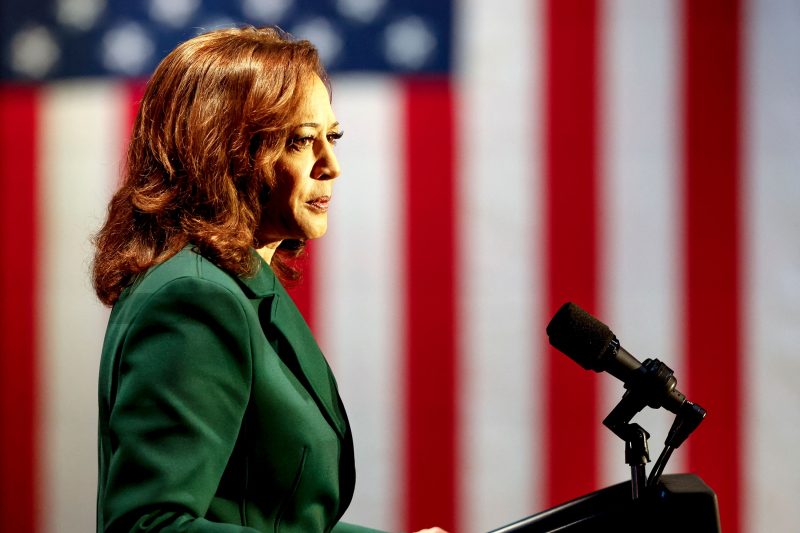As a longtime leader of the Cobb County Democrats, Jacquelyn Bettadapur has become highly attuned to the factors shaping her party’s fortunes in her home state of Georgia: the rise and fall of Stacey Abrams, Democrats’ unexpected surge in 2020, the enduring influence of Donald Trump.
Now, Bettadapur is worried about the political prospects of the woman positioned to be President Biden’s heir — Vice President Harris.
“People are poised to pounce on anything — any misstep, any gaffe, anything she says — and so she’s probably not getting the benefit of the doubt,” said Bettadapur, who recently stepped down as county party chair. Many Democrats, Bettadapur said, “don’t know enough about what she’s doing” — and, she added, “it doesn’t help that she’s not [that] adept as a communicator.”
Such concerns about Harris’s political strength were repeated often by more than a dozen Democratic leaders in key states interviewed for this story, some speaking on the condition of anonymity to convey candid thoughts. Harris’s tenure has been underwhelming, they said, marked by struggles as a communicator and at times near-invisibility, leaving many rank-and-file Democrats unpersuaded that she has the force, charisma and skill to mount a winning presidential campaign.
As Biden passes the halfway point of his term, Harris faces a critical moment. If he seeks reelection as expected, she would be a central part of the campaign, making it a high-stakes dress rehearsal for her own potential bid in 2028. If Biden steps aside, she would instantly move to center stage as his potential successor, facing the heightened attacks and scrutiny that accompany such a role.
Many Democrats worry that Biden’s age is a liability — he would be 86 at the end of a second term — but also fret over the lack of an alternative with a demonstrated ability to capture the party’s imagination, let alone 270 electoral votes. For many, that was supposed to be Harris, the first Black or Asian American woman to win a nationally elected office.
“Every fiber in my body wants her to be president; everything I’ve ever fought for is for someone like her to be president,” said one South Carolina Democratic strategist who spoke on the condition of anonymity for fear of damaging professional relationships. “I think she’s a good person with a good heart who can lead the country. But I don’t know that the people who have to make that happen feel that way right now. I don’t know that she has what it takes to get over the hump in our present environment.”
Underlining the concerns, Sen. Elizabeth Warren (D-Mass.), speaking on Boston radio station WGBH on Friday, shied away from a full endorsement of Harris as Biden’s 2024 running mate. Asked if the president should seek reelection, Warren responded quickly, “Yes, he should run again.” But asked if Harris should be his running mate, she said, “I really want to defer to what makes Biden comfortable on his team.”
WATCH: Elizabeth Warren Says ‘Yes’ Biden Should Run Again — But REFUSES To Say Kamala Harris Should Be His VP https://t.co/v8dMffGUir pic.twitter.com/WD8iOkuFpA
— Tommy moderna-vaX-Topher (@tommyxtopher) January 28, 2023
She likes Harris, Warren added, “but they need — they have to be a team.” She added quickly that she does not see any problems, but it was a notably noncommittal remark for an influential senator to make about her party’s second-in-command.
On Sunday, Warren issued a statement seeking to downplay her comments, saying, “I fully support the president’s and vice president’s re-election together, and never intended to imply otherwise.’
Broader doubts about Harris, Democrats say, largely fall into two categories. Some party members fear that Americans are simply not willing to elect a woman of color as president, especially given the racism and sexism they see emerging in recent years. Others worry that Harris herself lacks the political skills to win a national race.
And given the increasingly hard-edge tone of the Republican Party, they add, few Democrats are willing to roll the dice.
“I think many Democrats have changed from a 2008 sentiment, or even the feeling in 2012 and 2016, which were about voting for aspiration,” said Brady Quirk-Garvan, former chair of the Charleston County Democratic Party. “Democrats at the moment — I don’t hear a lot of chatter about aspiration. I hear about what’s going to guarantee a win, what’s a certainty, what feels safe.”
Many of the activists reached by The Washington Post said they like Harris personally and would support her if she became the nominee, but they are not convinced she has separated herself sufficiently from other potential White House aspirants. Several Democratic governors in particular have emerged in recent months, from Michigan’s Gretchen Whitmer and California’s Gavin Newsom to, more recently, Maryland’s Wes Moore and Pennsylvania’s Josh Shapiro.
That tension between excitement and safety is not new for Democrats, who fielded history’s most diverse crop of primary candidates in 2020 but ultimately selected Biden, a White man and veteran of the party’s mainstream, because many believed he was the safest bet to beat Trump. Some Democrats acknowledge that bypassing a woman of color because of electability concerns could be seen as a concession to historic prejudices — but they still wonder if, at this moment, the party can have both a big tent and a winning ticket.
Recent elections provide ammunition for both sides of the argument. The November midterms saw a record number of Black candidates for Senate and governor, several of them victorious, including Moore in Maryland and Sen. Raphael G. Warnock in Georgia. But failures are also etched into the Democrats’ memory, including Trump’s defeat of Hillary Clinton, the first woman to lead a major party ticket, and Abrams’s two losses in her effort to become the nation’s first Black female governor.
Harris’s office declined to comment for this story. But her supporters note that she remains one of the nation’s highest-profile Democrats, in demand at events and rallies across the country. And she has begun traveling more to advocate on the administration’s push to protect abortion access, an effort that could give her a bigger platform.
Within the party, they add, the vice presidency has often been a steppingstone to the presidential nomination. Every sitting or former vice president who has sought the Democratic nomination since 1972 has gotten it.
Still, Biden is the only one of those who went on to capture the White House. Walter Mondale lost to Ronald Reagan in 1984, and Al Gore fell short against George W. Bush in 2000.
Harris’s critics also question her basic political skills on the national stage. In 2016, she won her Senate seat against weak opposition, they say. In 2019, her presidential run ended before a single ballot was cast, doomed by an uneven performance on the campaign trail, weak support, faltering resources and turmoil among her advisers.
When Biden selected Harris as his running mate, it was widely seen as a second chance for her to establish a powerful base. As the first woman or person of color to hold the office, she had instant cachet and an influential platform. Many Democrats still view her as well-positioned to tap into the demographic shifts that are powering Democratic wins in critical states.
“She doesn’t walk around screaming, ‘I’m a Black woman, hear me roar,’ but she’s shown she’s able to handle whatever situation they ask her to participate in,” said Brenda Lee Pryce, a former South Carolina state legislator. She added, “There’s no doubt that Black women will support her 100 percent-plus, and we also have our White women who are very much pro-Kamala.”
Both supporters and skeptics say Harris has not been particularly visible, even in a job famous for its low profile. Biden and Harris were tethered to Washington during their first year by coronavirus restrictions. The first two years were further constricted for Harris, who held the tiebreaking vote in an evenly split U.S. Senate, forcing her to stay near the capital during close votes.
But Harris’s low profile has also been a reflection of her team’s calculus — and fears — following missteps and shaky public appearances. Her first international trip, to Guatemala and Mexico, was colored by an exchange with Lester Holt of NBC News in which she awkwardly downplayed the urgency of visiting the U.S.-Mexico border.
That moment sparked a debate among senior members of the vice president’s team about whether such interviews hurt more than they help, Harris’s advisers said privately. For months afterward, Harris treated such interviews warily, arguably depriving her of a wider audience and a bigger impact.
That skittishness has continued. One Democratic leader in Wisconsin said she is surprised that Harris had not spent more time there recently, given its electoral importance. “I don’t know if I’ve seen any reports of her being here or in other nearby states recently,” the Democrat said. “The vice president’s job is really to be that person out there.”
J.A. Moore, a South Carolina state lawmaker who endorsed Harris for president in 2020, said she would be well-served by raising her profile, which would be especially meaningful for groups that have been buoyed by having a Black vice president.
“I think the main thing is I wish she was out there and more visible,” Moore said, adding that he is still a Harris supporter and believes she will play a future leadership role in the party. “They want to see that representation, they want to see her face more and see her connection with what the administration is doing.”
Harris’s team, aware of her stumbles, has signaled any number of “resets” to suggest that the vice president is about to hit her stride. Harris officials say Jamal Simmons, Harris’s second communications director, was brought in to in part address the visibility issue, and he tried to increase the vice president’s travel, encouraging her to meet with key constituency groups across the country.
But while Simmons was brought in to solve one problem, his one-year tenure reflected another, namely, staff turnover. While most of Biden’s closest advisers have been by his side for decades, Harris has seen considerable change in the top ranks of her office during her vice presidency, particularly among those in charge of helping shape her public image.
Harris has her second chief of staff and her second chief spokesperson, and she will soon hire her third communications director. One of her closest and longest-serving aides, economic policy adviser Rohini Kosoglu, departed in August, saying she wanted to spend more time with her family.
Harris’s aides are once again suggesting her profile will grow in coming months, as Biden launches his campaign and now that Democrats have a 51-49 majority in the Senate so she will not be called on to break ties as frequently. Her supporters also see her advocacy for abortion rights as one more opportunity for Harris to make a stronger case for herself.
“The right of every woman in every state, in this country, to make decisions about her own body is on the line,” Harris said at a rally in Tallahassee last week. “And I’ve said it before, and I will say it again: How dare they? How dare they?”
Erick Allen, chair of the Cobb County Democrats, counts himself as a Harris loyalist but said he recognizes the forces in the party — and the country — pushing against her.
“There’s a segment that just will not vote for a woman for president, and there’s another segment that will not vote for an African American. Having two of those check boxes, you’re just going to have a higher threshold regardless,” Allen said. “Hillary had just one of those checks, and she was able to be vilified and beat up to the point where she couldn’t recover.”
As for Democrats, he said, “There are some people in our party who are saying, ‘We already have hurdles. Let’s not create more.’”








